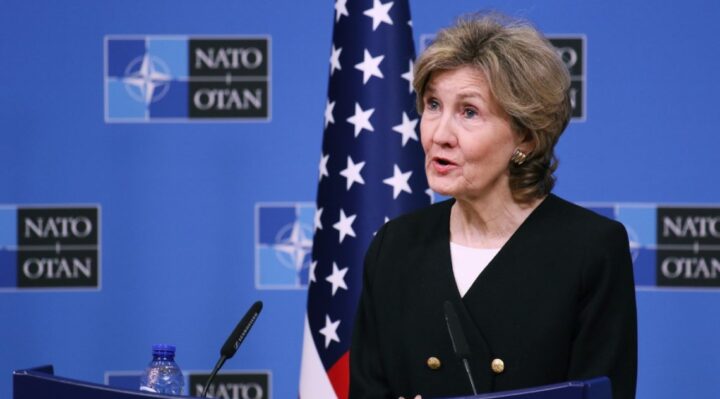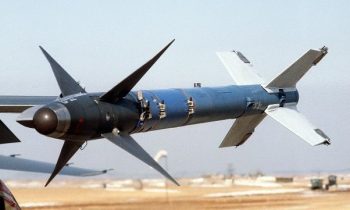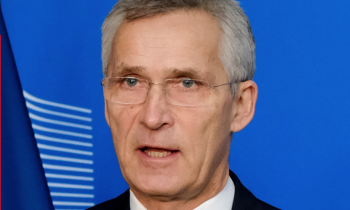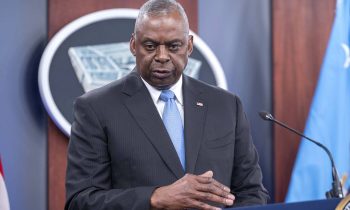Foreign ministers of Armenia and Azerbaijan may meet this week in Washington to discuss ways to stop hostilities in the Nagorno-Karabakh disputed region, US Representative to NATO Kay Bailey Hutchison told reporters on Wednesday.
“I believe that both foreign ministers are going to be meeting in Washington, at least that was a plan for them to meet in Washington this week to discuss a way to stop the violence, to stop the killing,” Hutchison said during a briefing in Brussels.

Azerbaijan Foreign Minister Jeyhun Bayramov and Armenia’s Zohrab Mnatsakanyan have confirmed that they will be visiting the United States on Friday, but there has been no word yet on the possibility of their face-to-face meeting.
Below is a full rush transcript of the press conference by Ambassador Kay Bailey Hutchison U.S. Permanent Representative to the North Atlantic Treaty Organization (NATO).
Ambassador Hutchison: I’m so glad to be with you and everyone as we look forward to the next two days of our Defense Ministerial. And I would just say that we will be addressing the current issues, of course. First of all, we are all dealing with COVID-19, and I am really pleased that the ventilators that the U.S. has put into our planning and our stockpile that we knew would have a second wave of COVID-19 to face, and we in fact think we are facing that right now, and our ventilators are being distributed as we speak to Albania, Montenegro, and North Macedonia.
So I think this is just one small part of the enormous interest in our all collective help for our allies in this COVID-19 pandemic. We’ve seen the first wave; we are now in the second wave, and NATO has had a plan put in place since June for the Defense Ministerial before in which we would share the trust funds and the in-kind contributions of NATO allies to help each other as we go through what appears to be a second wave. So I think we are in the process of doing that, and it is a high priority for us.
Most certainly, we will be discussing burden-sharing where our Sec Gen will report on the increases in defense spending by all of our allies. We are really pleased to see that 10 of our allies will now show that they are contributing 2 percent of their gross domestic product to their own defense spending that will allow NATO to have better and bigger capabilities, which is our collective defense. We’re pleased that we are seeing this go in the right direction. We still have a lot of work to do, but since the last six years, I guess, we have increased spending by our European and Canadian allies by $130 billion, and we know that that is going to continue to increase through the year 2024. And we will be seeing more and more of our countries meet that 2 percent pledge that was made at Warsaw years ago.
So we’re very pleased that we are moving in the right direction on burden-sharing and that we are in this alliance in our operations and in – and the efforts that we are making in COVID together.
I will say that in the ministerial, we will also be talking about our operations both in Afghanistan and in Iraq. Certainly, in Iraq we are supporting the new government there and working with Mr. Kadhimi to try to help him set up a government and eventually have elections for Iraq. And in Afghanistan we are supportive of the Afghan-led peace talks that are now going on and looking forward to continuing in that effort to support the Afghans so that they will have a durable peace that will allow Afghanistan to flourish as a country and, certainly, not allow a safe haven for terrorists, which is one of the reasons we went into Afghanistan for all of our security in our alliance and in our partners.
So thank you very much and we look forward to having these two days and I look forward to hearing from you.
Question : I’d like to ask the Ambassador if she could tell us what she thinks the diplomatic legacy of the Trump administration has been so far. What has it achieved? How has it changed international relations and ties between the U.S. and its NATO partners ?
Ambassador Hutchison: Well, I think that we have seen in NATO the firm commitment of the United States to the transatlantic bond. I think there’s no secret that President Trump had initially been skeptical about NATO, but I think that he has now acknowledged that our European partners with Canada as well have stepped up and started going in the right direction on burden-sharing and spending, and I think that is a major accomplishment. I was in the United States Senate for 20 years, and every president, Democrat and Republican, have said that Europe needs to do more for its own defense. Now I think President Trump has focused on that and it is now doing more, going in the right direction, and my colleagues tell me that they know they need to do more and they are working to do that and try to make sure that our transatlantic bond is strong.
So I think that is a very important next step that we see in our relationships in the transatlantic bond, and I think there’s no question that all of us are now pulling in the same direction for the security umbrella that we know we need to face with a world that is not safe and needs the security of likeminded, freedom-loving countries.
Question: Is there a possibility to extend the New START on Russia’s terms? And would Washington be ready to withdraw its strategic weapons from Europe, as requested by Russia, particularly for the sake of reaching an agreement on the extension of the New START?
Ambassador Hutchison: We are encouraged that we are very close to coming to an agreement that the U.S. has offered to the Russian counterparts that would have a two-way street that we would agree to a freeze on nuclear warheads for one year, and Russia would agree also with us on a one-year extension of New START that is verifiable and that we can assure will freeze where we are and then start the negotiation on a long-term, new New START.
Question: Are there any more details on the U.S. troop withdrawal from Afghanistan and the U.S. troop reduction in Germany that will be shared with allies during the Defense Ministerial? Will these two reductions go ahead regardless of the U.S. election result?
Ambassador Hutchison: Well, let me take the second part first. I don’t think there will be a reduction of troops in Europe. I think there is an effort to begin to look at ways to make those troops more efficient by consolidating some of the headquarters in one place and having some of the troops in other places in Europe. But I think the plans are going forward. It will take certainly a lot of effort to decide how to move troops and making sure that there is an infrastructure that will allow a movement of troops. So I think all of that is in the works.
On the issue of Afghanistan, we have been consulting with our allies, and as of just last week we had the commander of our forces in Afghanistan brief our NATO council, our 30 ambassadors, on where we are with the previously briefed troop drawdown where we together have decided to go down to a lower number 4,500 for America; approximately 6,000 for our allied troops that would be with us there which is still able to do all of the training and advising that we are doing with Afghan forces who are out in the field fighting for the freedom of the Afghan people. And that is ongoing and there have been no different orders for where we are, and we’re almost to that point now that have been agreed to by our NATO council.
Going forward, we will be looking at conditions on the ground to determine if there is a capability to draw down more troops, which we all would hope that conditions would allow us to do that. But certainly, the conditions have not been met at this time.
Let me just say that all of us want the Afghan-led peace talks to go forward. We are very concerned with the violence that the Taliban has been producing in violation of the spirit of the agreement they made with the U.S., if not the letter of that agreement. We are calling for a ceasefire or a significant reduction in violence, which we have not seen. And we call on the Taliban to reduce that violence so that the conditions can be met, which is what all of us would like so that Afghans can decide for themselves how they can live together in peace and be at peace with their neighbors and assure that no terrorist groups would be able to grow in their country and be a cancer on their country and be exported to NATO allies. That’s our goal and we are going to support the Afghan process to achieve that goal.
Question: Turkish media reported that NATO member Turkey has tested its S-400 Russian-made air defense missile system. Has Turkey informed its NATO partners, and how will that impact American-Turkish bilateral cooperation and relations, and how does it affect NATO? On the other hand, there are also reports that another NATO ally, Greece, is preparing to conduct firing tests for the first time in 22 years with the S-300s in Crete. How do you view these developments?
Ambassador Hutchison: We are very concerned about, well, the – of course, the uptick in tensions between Turkey and Greece. But America since 2017, when the Turkish Government said they were going to buy an S-400, we along with our whole NATO alliance has done everything we could to divert Turkey from buying a missile defense system by our acknowledged adversary, Russia, and putting that into our NATO alliance is a red line. There is no doubt about it. For that, Turkey has given up the ability to be a major maintenance facility and manufacturing line for the F-35, which is the next generation of fighter aircraft. They’ve given up a lot to have a Russian missile defense system in Ankara, and we are very unhappy that we have not been able to dissuade them from sticking with our alliance and sticking with another ally to be able to work through their sovereign issues without reaching out to a Russian missile defense system.
There were many other missile defense systems offered to Turkey: a Norwegian system; the SAM, which is Italian and French; the Patriot, which is American. They had many choices, and that they have tested* a S-400 Russian system within our NATO alliance is very troubling for all of us.
Question: The NATO Secretary General will meet the Armenian president at the NATO headquarters today to discuss the war in Nagorno-Karabakh. Will you raise this issue with your Turkish counterpart, and do you think NATO should play a bigger role in Nagorno-Karabakh?
Ambassador Hutchison: Well, NATO is trying to do what the U.S. is doing, what Russia is doing as well, and that is to try to stop the conflict in Nagorno-Karabakh. This is an issue that has been festering for 30 years. There is a Minsk Group of co-chairs, which is U.S., Russia, and France, that is willing to go into the initial conflict, which is where are the sovereign boundaries of Azerbaijan and what can accommodate the Armenian population within those boundaries? That can be settled, and then this conflict would end.
In the meantime, we are encouraging both sides – and I believe that both foreign ministers are going to be meeting in Washington; at least that was a plan for them to meet in Washington this week – to discuss a way to stop the violence, stop the killing. This cannot be settled in a military conflict. It needs to be settled on the issues of the boundary lines and the sovereignty issues. And that’s what we are pushing for, Russia is pushing for the same, as well as France. And we hope they will agree to that group or any group they could both agree would be trustworthy to them to solve this underlying issue so that the conflict and the killing and the destruction can stop in that area.
Question: Despite NATO’s mediatory efforts between Turkey and Greece, tensions are still high in the Eastern Mediterranean. What is the U.S. position on the issue? What could NATO do more to contribute to de-escalation between its two allies? And how may this dispute between the two allies of the southern flank affect NATO?
Ambassador Hutchison: Well, of course, we are very worried about that conflict, and NATO has had a role in the de-confliction. We don’t have a role in the underlying issue that is the genesis of the problem, and that is what are the – the water issue – the border issues in the water, the navigation rights. And it is very important for all of us that this not be settled in a military conflict as well, and NATO has been effective in putting forward steps that could de-conflict before there is any kind of a military altercation or mistake.
So we have done that. But the underlying issue has to be solved, and that is: what are the water boundaries between Turkey and Greece or Cyprus? And that can only be done with an agreed arbitrator, and that is Germany. So we are urging both parties to not have a conflict that would fester into any kind of destruction, but to go back to Germany and settle the issue of what are the water rights and what are the navigation rights between those two countries that are fairly close together, which is what has caused the normal boundaries for international waters to not be as easy to settle as it would be if they were further apart.
Question: What will be the primary mission of the new NATO space center in Ramstein? Is Russia the main reason for creating it? What is the U.S. attitude to the Russian and Chinese proposal in the UN to prevent the militarization of space?
Ambassador Hutchison: Well, I think that it is very important that we have established space as a domain for NATO and for our security interests, and that is because in the new technology that we now see other countries with activities in space – satellites – we are hoping that all of the countries that have space capabilities will agree to some steps that will assure that we don’t put satellites in places where they could crash or come together; that we would be transparent in where we would be doing activity in space. And the space domain will give us a chance to hopefully do this right so that there will not be mistakes or accidents.
Also, space debris is an issue that all of us are facing that have activities in space. And by having transparencies and sharing information, hopefully we would be able to keep from having any kind of space debris that would interfere with the capabilities that are being used.
So space is a new area that all of us are trying to address in the right mode, but it’s also an area that can be used for malign intent, and we want to make sure that we are a deterrent to assure that we have the capabilities to keep from having our satellites and the activities that we are using satellites for interrupted. So we are in to space, we have space headquarters, we have space centers of excellence, and we are working to hopefully have agreement from all the countries that are active in space to be transparent and to share information so that there will not be accidents, as well as conflicts.
Question: Could you please update us on the status of U.S. troops in Eastern Europe? Is there a plan for a deployment of U.S. troops there on an enduring basis?
Ambassador Hutchison: Well, we have announced that we have rotating forces in Eastern Europe. That really came about after Russia took Crimea out. They haven’t taken them out of Ukraine; they are still part of Ukraine. But Russia is now militarizing Crimea, and for that reason we must make sure that all of our allies on the Black Sea and elsewhere are protected. So we have rotating troops, which we have been transparent about in our enhanced forward presence, our tailored forward presence, which includes the eastern allies – the Baltics, Poland, certainly Romania and Bulgaria – to make sure that the militarization of Crimea, which is very close in proximity to many of our allies, and the illegal attempt to take Crimea out of the Ukraine have caused us to require an enhanced presence that is not permanent-based, but it is a rotational level of forces to assure that we are deterring any further activities of Russia, and hope for the future that Crimea will come back to its rightful sovereign territory in Ukraine.
Ambassador Hutchison: Well, just thank you so much for the Brussels Hub at our embassy in Brussels to give us this opportunity to hear from international members of the media and to be able to talk about what NATO is doing. I’m really pleased that our NATO alliance has been able to operate for 21 – 71 years now, and in 2020 that was our 71st year. And it has been an alliance that has succeeded because we have remained in a transatlantic bond and have operated by consensus. And we look forward to our Defense Ministerial. We will have a Foreign Ministerial in December. And that’s where our leaders are able to talk about the most important issues of the day and coordinate our efforts for the security umbrella that protects Canada, the United States, and our European allies.



